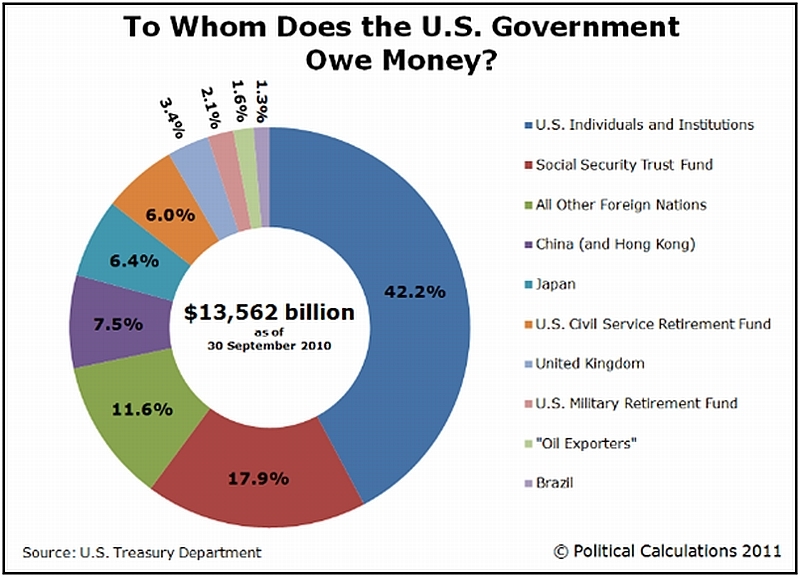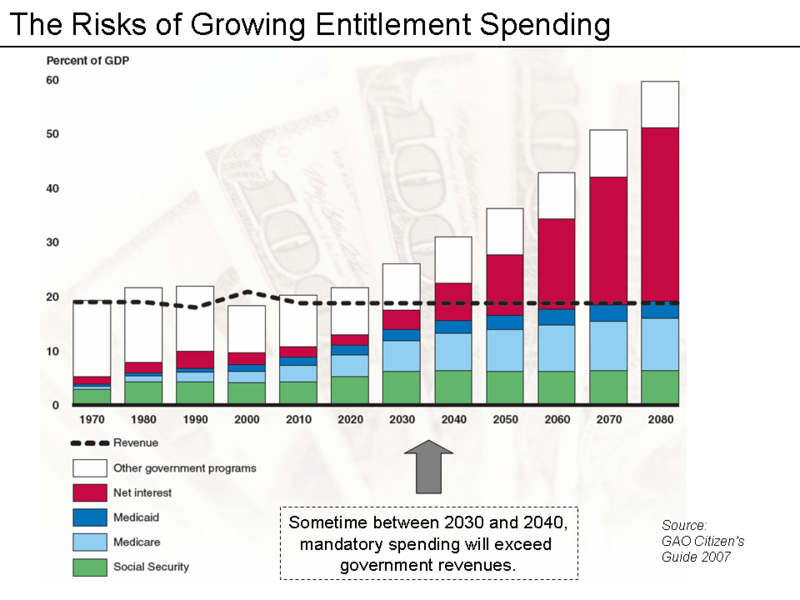Historical context
Oil prices 1968–2006; peak is 1980, with steep decline over 1980s.
Prior to the Reagan administration, the United States economy experienced a decade of rising unemployment and inflation, known as stagflation. Political pressure favored stimulus resulting in an expansion of the money supply. President Richard Nixon's wage and price controls were abandoned.[5] The federal oil reserves were created to ease any future short term shocks. President Jimmy Carter started phasing out price controls on petroleum, while he created the Department of Energy. Much of the credit for the resolution of the stagflation is given to two causes: a three year contraction of the money supply by the Federal Reserve Board under Paul Volcker, initiated in the last year of Carter's presidency,[5] and long term easing of supply and pricing in oil during the 1980s oil glut.
Taxes
President Reagan lifted remaining domestic petroleum price and allocation controls on January 28, 1981[6] and lowered the oil windfall profits tax in August 1981, helping to end the 1979 energy crisis. He ended the oil windfall profits tax in 1988 during the 1980s oil glut.[citation needed]
With the Tax Reform Act of 1986, Reagan and Congress sought to broaden the tax base, eliminate many deductions, and reduce rates. In 1983, Democrats Bill Bradley and Dick Gephardt had offered a proposal to clean up/broaden the tax base; in 1984 Reagan had the Treasury Department produce its own plan. The eventual bipartisan 1986 act aimed to be revenue-neutral: while it reduced the top marginal rate, it also partially "cleaned up" the tax base by curbing tax loopholes, preferences, and exceptions, thus raising the effective tax on activities previously specially favored by the code.
<snip>
Economic record
Reagan's policies are widely recognized as bringing about the second longest peacetime economic expansion in U.S. history, surpassed in duration only by the 1990s expansion that began under George H. W. Bush in 1991.[10][11] During the Reagan administration, the American economy went from a GDP growth of -0.3% in 1980 to 4.1% in 1988 (in constant 2005 dollars),[12] which reduced the unemployment rate by 1.6%, from 7.1% in 1980 to 5.5% in 1988, but with peaks of around 9.5% in 1982 and 1983.[13] A net job increase of about 21 million also occurred through mid-1990. Reagan’s administration is the only one not to have raised the minimum wage.[14] The inflation rate, 13.5% in 1980, fell to 4.1% in 1988, which was achieved by applying high interest rates by the Federal Reserve (peaked at 20% in June 1981).[15] The latter caused a brief recession in 1982: unemployment rose to 9.7% and GDP fell by 1.9%.
Reagan significantly increased public expenditure, primarily the Department of Defense, which rose (in constant 2000 dollars) from $267.1 billion in 1980 (4.9% of GDP and 22.7% of public expenditure) to $393.1 billion in 1988 (5.8% of GDP and 27.3% of public expenditure); most of those years military spending was about 6% of GDP, exceeding this number in 4 different years. All these numbers had not been seen since the end of U.S. involvement in the Vietnam War in 1973.[16] In 1981, Reagan significantly reduced the maximum tax rate, which affected the highest income earners, and lowered the top marginal tax rate from 70% to 50%; in 1986 he further reduced the rate to 28%.[17] The federal deficit fell from 6% of GDP in 1983 to 3.2% of GDP in 1987.[3] The Federal deficit in Reagan's final budget fell to 2.9% of GDP.[2] The rate of growth in Federal spending fell from 4% under Jimmy Carter to 2.5% under Ronald Reagan.[2] As a short-run strategy to reduce inflation and lower nominal interest rates, the U.S. borrowed both domestically and abroad to cover the Federal budget deficits, raising the national debt from $997 billion to $2.85 trillion.[18] This led to the U.S. moving from the world's largest international creditor to the world's largest debtor nation.[19] Reagan described the new debt as the "greatest disappointment" of his presidency.[20]
The number of Americans below the poverty level increased from 29.272 million in 1980 to 31.745 million in 1988, which means that, as a percentage of the total population, it remained almost stationary, from 12.95% in 1980 to 13% in 1988.[21] The poverty level for people under the age of 18 increased from 11.543 million in 1980 (18.3% of all child population) to 12.455 (19.5%) in 1988.[22] The share of total income going to the 5% highest-income households grew from 16.5% in 1980 to 18.3% in 1988 and the share of the highest fifth increased from 44.1% to 46.3% in same years. In contrast, the share of total income of the lowest fifth fell from 4.2% in 1980 to 3.8% in 1988 and the second poorest fifth from 10.2% to 9.6%.[23] And during Reagan's first term, homelessness became a visible problem in America's urban centers, leading many to blame Reaganomics.[24] In the closing weeks of his presidency, Reagan told the New York Times that the homeless "make it their own choice for staying out there." [25] Political opponents chided his policies as "Trickle-down economics", due to the significant cuts in the upper tax brackets.[26]
Tax receipts
During the Reagan administration, federal receipts grew at an average rate of 8.2% (2.5% attributed to higher Social Security receipts), and federal outlays grew at an annual rate of 7.1%.[27][28] According to a 1996 report of the Joint Economic Committee of the United States Congress, during Reagan's two terms, and through 1993, the top 10% of taxpayers paid an increased share of tax revenue to the Federal government, while the lowest 50% of taxpayers paid a reduced share of the tax revenue.[29]
According to a United States Department of the Treasury economic study,[30] the major tax bills enacted under Reagan, in the short term, increased total tax revenue and reduced the tax burden on the economy (~-1% of GDP). The Economic Recovery Tax Act of 1981 resulted in a reduced tax burden on the economy (~-3% of GDP) but a decrease in total tax revenues (the largest tax cuts ever enacted).[31] while other tax bills had neutral or, in the case of the Tax Equity and Fiscal Responsibility Act of 1982, a (~+1% of GDP) increase in revenue as a share of GDP. It should be however noted that the study did not examine the longer-term impact of Reagan tax policy, including sunset clauses and "the long-run, fully-phased-in effect of the tax bills".[30] The fact that tax receipts as a percentage of GDP fell following the Economic Recovery Tax Act of 1981 shows a decrease in tax burden as share of GDP. Total tax revenue from income tax receipts increased during this time. The economic growth and increase in GDP outpaced the increase in tax receipt revenue, resulting in a slightly reduced tax burden as a percentage of GDP for the economy.


